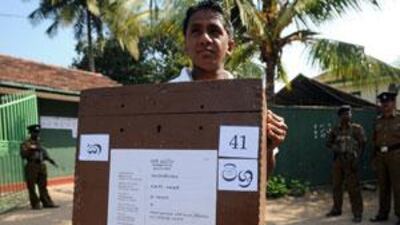Colombo // More than 14 million Sri Lankans are expected go to the polls today to elect a leader. The incumbent president, Mahinda Rajapaksa, and former army commander Gen Sarath Fonseka, the two main candidates, look set for a close finish in a campaign that has been marred by violence and widespread violations of electoral laws.
A slew of allegations have been hurled by both camps, with Gen Fonseka and his supporters accusing the president and his family of corruption and abuse of power, while Mr Rajapaksa has accused the general of corrupt deals while in the army. Amid the acrimony there are fears of polling-day violence and intimidation of voters, and police have been given shoot-on-sight orders to deal with troublemakers.
The senior deputy inspector general of police, Gamini Navaratna, told the Daily Mirror news website yesterday that police will initially issue a warning to anyone attempting to instigate violence or damage polling booths, but "if the warning is not respected, then the police have orders to open fire". Mr Rajapaksa, who called the presidential poll two years before his six-year term ends in 2011, is battling against his former army commander, whose sudden entry into the election race came as something of a shock to the president. Before the general announced his candidacy, Mr Rajapaksa had been expected to win re-election with ease.
Gen Fonseka has united anti-Rajapaksa groups in a powerful alliance, providing a formidable foe for the president. Media reports say the general has been gaining ground on the president and now stands a real chance of winning. The victory last May against Tamil separatist rebels that put an end to a 30-year-long conflict has been a key electoral slogan for the candidates, who are both trying to take the credit for it.
Political analysts say that Mr Rajapaksa still retains the edge in the contest given his more expensive campaign that has seen billboards and posters plastered across the countryside and the touting of his 40 years of political experience against Gen Fonseka, a political novice. "While it looks to be closely fought, President Rajapaksa has the edge. Both sides are claiming victory, but it's hard to say," said Jehan Perera, a columnist with Sri Lanka's English-language Island newspaper.
But Perera added that if early results favour Gen Fonseka, there was a real risk of pro-Rajapaksa officials disrupting the counting of votes. Analysts say there have already been numerous violations of electoral regulations by the government. JC Weliamuna, the executive director of the Sri Lanka office of Transparency International, the global governance watchdog, said the campaign has been the worst in Sri Lanka's history.
The number of election-related incidents so far number more than 700, including assaults on opposition campaigners, the destruction of property, including Gen Fonseka's political offices and the homes of his supporters, and as many as six killings. "The level of abuse by the state is unprecedented," Mr Weliamuna said. Opposition parties have accused the police and some government agencies of carrying out political work for the president.
Election posters and cut-outs of candidates are banned in Sri Lanka but the elections commissioner Dayananda Dissanayake has watched helplessly as the law has been flagrantly ignored. His orders to police to remove them have only led to opposition candidate's posters being pulled down while the president's remained in place. Election laws also specify equal coverage for all candidates in the state-owned media - newspapers, television and radio - as these are run with public funds. Here too, the ruling party has been favoured.
Mr Dissanayake told reporters on Sunday that he expects a voter turnout of 80 per cent, high in a country where polls average between 60 per cent to 75 per cent. While the Sinhalese-dominated south is likely to be divided between Mr Rajapaksa and Gen Fonseka, the key to victory lies in the north where most of the Tamil minority live, analysts say. Sinhalese make up roughly 74 per cent of the country's 20 million population, while Tamils and Muslims account for most of the remainder.
In the 2005 presidential election, the leader of the opposition United National Party (UNP), Ranil Wickremesinghe, obtained more than 70 per cent of the vote in the northern districts of Jaffna and Vavuniya, yet he lost to Mr Rajapaksa as less than 15 per cent of the 700,000 voters in Jaffna cast their ballots after Tamil rebels called a boycott of the polls. The rebels are no more and journalists in the region say there is more support for Gen Fonseka than for the president, one of the reasons being that Mr Wickremesinghe's UNP is backing the opposition candidate.
"The people are backing Gen Fonseka because the main Tamil party here, the Tamil National Alliance, has also urged people to vote for the opposition candidate," said a senior newspaper editor in Jaffna, who asked to remain anonymous for fear of repercussions. He added that in a clean poll, votes from Jaffna could decide the winner. But he said there were worries that the poll will be marred by voter intimidation, including the possibility that bombs may be set off to scare voters away from going out to cast their votes.
"Some senior commanders of the army and senior police officers have been transferred [here], triggering fears that there could be rigging or other forms of intimidation," the journalist said. Security has been tightened in the capital and other areas amid fears of protests or even riots if people believe the vote has been rigged or official intimidation and abuse of power has played a role in the result.
foreign.desk@thenational.ae

